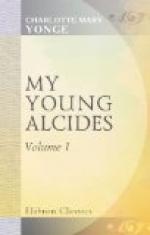I was at Arked one day, and Lady Diana was telling me of the great rambling house at Killy Marey, and how, when she arrived as a bride, none of the doors would shut except two that would not open, behind one of which lived the family ghost; how the paper hung in festoons on the walls, and the chairs were of the loveliest primrose-coloured brocade; and how the green of the meadows was so wonderful, that she was always remembering it was the Emerald Isle; but how hopeless and impossible it was to get anything properly done, and how no good could be done where the Romish priests had interfered. All the old story of course. In the midst, a telegraph paper was brought to her; she turned deadly white, and bade me open it, for she could not. I knew she thought her son had met his father’s fate, and expected to astonish her with the tidings that he was coming home by the next steamer, or that he had sent some game, or the like. Alas! no; the mother’s foreboding had been too near the truth. The telegram was from Eustace: “Tracy has had a bad horse accident. The doctor wishes for you.”
There was nothing for it but to speed the mother and daughter on their hurried start to catch the Holyhead packet and cross that night. I went home to await in terror and trembling the despatch I might receive, and to be enlivened by Mrs. Sam Alison’s cheering accounts of all the accidents she could recollect. “Horses are dangerous creatures to meddle with, and your poor papa never would let me take the reins when we kept a gig—which was when he was living, you know, my dear. ‘You never can trust their heels,’ he used to say; and it was only last week little Cocker was kicked off, but that was a donkey, and they were using him shamefully,” &c. &c. &c. I felt as if a swarm of bees were humming in my ears, and walked about to make the suspense more tolerable, but I absolutely had no news at all till Viola’s letter came. It was a long one, for she could be of no service as yet, and to write letters was at once her use and her solace.
Among the horses which Dermot’s Irish agent had been buying for training purposes was a mare, own sister to Harold’s hunter—a splendid creature of three years old, of wonderful beauty, power, and speed, but with the like indomitable temper. She would suffer no living thing to approach her but one little stable-boy, and her own peculiar cat, which slept on her back, and took all sorts of liberties with her. Her value would be great if she could be trained, but the training was the problem. Harold, who, partly from early familiarity, partly from the gentleness of fearless strength, had a matchless power over horses, had made acquaintance with her one evening, had been suffered in her box, had fed her, caressed her cat, and led her round the stable-yard as a first stage in the conquest of horse by man.




